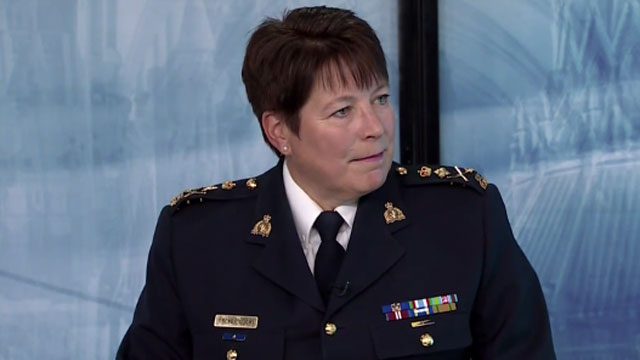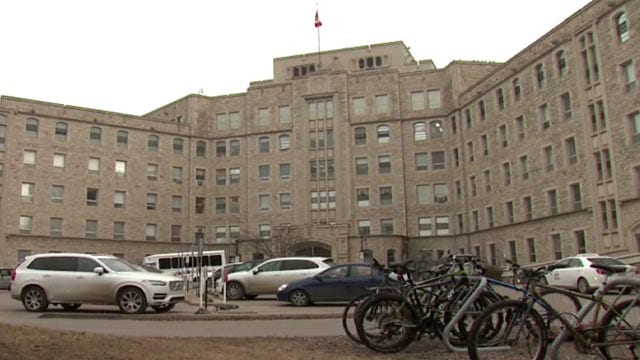

APTN News
The RCMP is seeking the names of potential victims of coerced sterilization procedures and wants lawyers to help in the process, RCMP Commissioner Brenda Lucki said Tuesday.
In testimony before the House of Commons health committee, Lucki said the RCMP is willing to meet with victims, adding it would be helpful if lawyers could talk to complainants about coming forward.
“The lawyers…if they were to speak with those victims and provide them the options of coming to the police, we would absolutely sit down with each and every victim that they had to look at it from a criminal point of view,” she said.
“Obviously they are not going to release their names without their consent as well. But…if we were to have those conversations, and possibly we could convince victims to come forward through the lawyers, that would be one avenue that we could explore.”
MPs asked Lucki to testify as part of a study about ongoing concerns from predominantly Indigenous women who allege they were coerced or forced into tubal ligation procedures during childbirth.
Her testimony also followed a letter sent this spring by NDP health critic Don Davies who asked the RCMP to conduct an investigation of serious and credible allegations that have been brought forward.
APTN Investigates has reported a number of alleged coerced sterilizations of Indigenous women.
One woman who can’t be named because of a court imposed publication ban, told APTN that, when she gave birth to a baby girl at the Royal University Hospital in Saskatoon in 2010, she was pressured into consenting to permanent sterilization by a physician, a social worker, and hospital staff because she was a recovering addict.

An incident of coerced sterilization of an Indigenous women is alleged to have taken place at the Royal University Hospital in Saskatoon, Sask. in 2010. APTN file photo.
“They clearly heard me say I do not want to do this,” she said. “It was clear I didn’t want to do this. They kept harassing me and harassing me every time they came in my room.”
After she went public with her story, other Indigenous women began to come forward with similar accounts.
Another woman, who also can’t be named, told APTN told she was pressured into sterilization at the hospital while in full labour with her second child in 2008.
“I didn’t have any family or friends with me,” she said. “One of the nurses had approached me and she said, “You know, clearly you don’t want to be in this kind of position again and there’s this option available of having your tubes tied.”
She said staff told her there were no side effects and that the procedure could be reversed.
Lucki told Davies in a March letter that the force would work with commanding officers in each province and territory as well as other police agencies to see if any complaints have been reported.
“To date, we have no allegations that are on file for forced or coerced sterilization that were found to be reported to the RCMP directly,” Lucki said Tuesday, explaining the RCMP takes all criminal allegations very seriously and that the force has reached out to the Canadian Association of Chiefs of Police to raise awareness.
In 2017, the Saskatchewan Health Region issued a public apology after complaints from Indigenous women, and a proposed class-action lawsuit was launched naming as defendants the Saskatoon Health Authority, the provincial and federal governments, and a handful of medical professionals.
Dr. Judith Bartlett, a Métis physician who co-authored the external review, told the committee on Tuesday that Indigenous women interviewed for the report often felt invisible, profiled and powerless.
She also said she does not believe women will come forward to the RCMP because there is “no safety there for them.”
Those interviewed for the report were granted anonymity, she said, noting they often felt much better having been able to express the harm done to them.
Much more research is needed to understand the scope of the problem because any time an individual is asked to make a decision when they’re not in the state of mind to weigh pros and cons constitutes coercion, Bartlett said.
Dr. Jennifer Blake, chief executive of the Society of Obstetricians and Gynaecologists of Canada, told MPs that obtaining consent for tubal ligations at the time of delivery should be avoided at all costs. She also noted that when she first learned of allegations a forced sterilizations, she thought it was in reference to a historical issue.
Last Tuesday, lawyer Alisa Lombard, a partner with the firm Semaganis Worme Lombard, told the health committee she represents a client, referred to as D.D.S., was sterilized without proper and informed consent in December 2018 at a Moose Jaw, Sask., hospital.
That same month, the United Nations Committee Against Torture urged Canada to act to address the issue of coerced sterilization, setting a one-year deadline to report back on progress.
In response, Health Minister Ginette Petitpas Taylor and Jane Philpott, then Indigenous services minister, sent a letter to provinces and territories proposing a working group of officials to discuss the concerns.
Health Canada said Tuesday the group has had “productive discussions” about the scope and purpose of the federal-provincial-territorial plan to “advance cultural safety and humility in the health system.”
As a first step, officials decided Health Canada would take the lead on “an environmental scan of cultural safety initiatives and practices across Canada,” the agency said in a statement.
Lucki told the health committee the level of trust of the RCMP among Indigenous peoples “varies…depending on the community,” and that RCMP is working at developing empathy in addition to compassion.
“It falls in line not just with reconciliation,” she said. “But if…our organization can learn to walk a mile in somebody’s shoes I think we would have a better understanding of their circumstance. And they would be treated differently if we had that understanding.”
The commissioner also noted that investigations of alleged coerced sterilization “would fall under the mandate of the police of jurisdiction,” which in areas with municipal or provincial forces may not be the RCMP.
Earlier this month the National Inquiry into Missing and Murdered Indigenous Women and Girls released its final report, citing coerced sterilization as one of the forms of violence against Indigenous women contributing to the inquiry’s findings of genocide.
Among its calls for justice, which its Chief Commissioner Marion Buller referred to as “legal imperatives” for governments and other stakeholders, the inquiry called upon “all governments and health service providers to recognize that Indigenous Peoples…are the experts in caring for and healing themselves, and that health and wellness services are most effective when they are designed and delivered by the Indigenous Peoples they are supposed to serve.”
The inquiry also called on institutions and health service providers “to ensure that all persons involved in the provision of health services to Indigenous Peoples receive ongoing training, education, and awareness in areas including, but not limited to: the history of colonialism in the oppression and genocide of Inuit, Métis, and First Nations Peoples.”
With files from Cullen Crozier and The Canadian Press.










Straight talk
Do you RCMP know how to investigate or just stay under your rocks? I have never heard such stupidity in the justice system in canada, Such racists, liers, yes this is happening in your jurisdiction. Murders, racist killings, girl killed by iron piece thrown at her, too many so called suicides, get some help for community, do not try brush this off as an Indian problem. RCMP ARE CORRUPT.EH